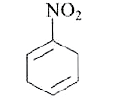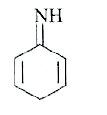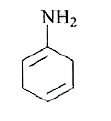Reduction of an aldehyde produces
Primary alcohol
Monocarboxylic acid
Secondary
Tertiary alcohol
The correct Answer is:A
To solve the question "Reduction of an aldehyde produces," we need to understand the chemical process involved in the reduction of aldehydes.
1. Understanding Aldehydes: Aldehydes have the general formula RCHO, where R is a hydrocarbon chain and the carbonyl group (C=O) is at the end of the molecule.
2. Reduction Process: Reduction refers to the gain of electrons or the addition of hydrogen to a molecule. In the case of aldehydes, the carbonyl group (C=O) is reduced to a hydroxyl group (–OH).
3. Using a Reducing Agent: Common reducing agents for aldehydes include hydrogen gas (H2) in the presence of a catalyst (like nickel), lithium aluminum hydride (LiAlH4), or sodium borohydride (NaBH4). These agents provide the necessary hydrogen for the reduction process.
4. Conversion to Alcohol: When an aldehyde is reduced, the carbonyl carbon (C=O) is converted to a carbon with a hydroxyl group (–OH) and two hydrogen atoms. This transformation results in the formation of a primary alcohol.
- For example, if we take ethanal (acetaldehyde, CH3CHO) and reduce it, we get ethanol (CH3CH2OH), which is a primary alcohol.
5. Conclusion: Therefore, the reduction of an aldehyde produces a primary alcohol.
Final Answer:
Reduction of an aldehyde produces a primary alcohol.
---
Reduction of an aldehyde produces a primary alcohol.
Topper's Solved these Questions
- ALDEHYDES,KETONES & CARBOXYLIC ACIDS BOOK - VMC MODULES ENGLISHCHAPTER - ALDEHYDES,KETONES & CARBOXYLIC ACIDS EXERCISE - IN-CHAPTER EXERCISE-I
10 Videos
- ALDEHYDES,KETONES & CARBOXYLIC ACIDS BOOK - VMC MODULES ENGLISHCHAPTER - ALDEHYDES,KETONES & CARBOXYLIC ACIDS EXERCISE - IN-CHAPTER EXERCISE-j
10 Videos
- ALDEHYDES,KETONES & CARBOXYLIC ACIDS BOOK - VMC MODULES ENGLISHCHAPTER - ALDEHYDES,KETONES & CARBOXYLIC ACIDS EXERCISE - IN-CHAPTER EXERCISE-G
10 Videos
- ALCOHOLS, PHENOLS & ETHERSBOOK - VMC MODULES ENGLISHCHAPTER - ALCOHOLS, PHENOLS & ETHERSEXERCISE - Impeccable
100 Videos
- AMINESBOOK - VMC MODULES ENGLISHCHAPTER - AMINESEXERCISE - IN CHAPTER EXERCISE H
10 Videos
Similar Questions
Knowledge Check
Birch reduction of aniline will produce :
A B
B C
C D
D
Reduction of aldehydes and ketones into hydrocarbons using Zn−Hg+HClcalled.
View SolutionIn addition to an aldehyde group, glucose contains:
View SolutionReduction of Aldehydes and Ketones to hydrocarbon take place in the presence of
View SolutionThe product formed by the reaction of an aldehyde with a primary amine is:
View SolutionDuring reduction of aldehydes with hydrazine and potassium hydroxide, the first is the formation of
View SolutionA compound 'X' on ozonolysis followed by reduction gives an aldehyde, C2H4O and 2-butanone. Compound 'X' is:
View SolutionReductive amination of aldehydes or ketones done with NH3 yields product (A ) which when dehydrated gives (B ) . Which of these is mostly likely product (B ) ?
View Solution
